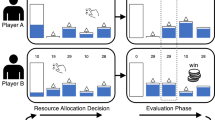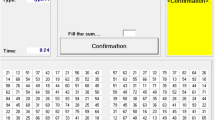Abstract
One hundred and twenty subjects competed in a reaction-time task similar to that of Taylor (1967). Subjects were randomly assigned to a white noise, fine, or control condition. In the fine and noise conditions programmed “opponents” administered increasing provocation to subjects over a series of 24 trials. Control subjects were not provoked. As predicted, males retaliated with higher levels of noise than did females, while there were no sex differences in the fine condition. Contrary to prediction, sex of opponent had no effect. Subjects in all conditions tended to view the task as competitive but to devalue their opponent only in the noise condition. The prevalent assumption of female passivity in the face of instigation was rejected. Instead a dichotomy was proposed that while females are less likely than males to reciprocate to physical provocation, they are just as likely to respond to provocation of a nonphysical nature.
Similar content being viewed by others
References
Bardwick, J. Psychology of women: A study of biocultural conflicts. New York: Harper & Row, 1972.
Bedell, J., & Sistrunk, F. Power, opportunity costs, and sex in a mixed-motive game. Journal of Personality and Social Psychology, 1973, 25, 219–226.
Brock, T. C., & Buss, A. H. Effects of justification for aggression and communication with the victim on postaggression dissonance. Journal of Abnormal and Social Psychology, 1964, 68, 403–412.
Buss, A. H. Instrumentality of aggression, feedback, and frustration as determinants of physical aggression. Journal of Personality and Social Psychology, 1966, 3, 153–162.
Feshbach, S. Aggression. In P. H. Mussen (Ed.), Carmichael's manual of child psychology (Vol. 2). New York: Wiley, 1970.
Gallo, P. S., & Sheposh, J. Effects of incentive magnitude on cooperation in the prisoner's dilemma game: A reply to Gumpert, Deutsch, and Epstein. Journal of Personality and Social Psychology, 1971, 19, 42–46.
Gergen, K. J. The psychology of behavior exchange. Reading, Mass.: Addison-Wesley, 1969.
Hatfield, J. S., Ferguson, L. R., & Alpert, R. Mother—child interaction and the socialization process. Child Development, 1967, 38, 365–414.
Komorita, S. S., & Mechling, J. Betrayal and reconciliation in a two-person game. Journal of Personality and Social Psychology, 1967, 6, 349–353.
Larsen, K. S., Coleman, D., Forbes, J., & Johnson, R. Is the subject's personality or the experimental situation a better prediction of a subject's willingness to administer shock to a victim? Journal of Personality and Social Psychology, 1972, 22, 287–295.
Maccoby, E. E. (Ed.). The development of sex differences. Stanford, Calif.: Stanford University Press, 1966.
Maccoby, E. E., & Jacklin, C. N. The psychology of sex differences. Stanford, Calif.: Stanford University Press, 1974.
McIntyre, A. Sex differences in children's aggression. Proceedings of the Eightieth Annual Convention of the American Psychological Association, 1972, 7, 93–94. (Summary)
Marwell, G., Schmitt, D. R., & Shotola, R. Cooperation and interpersonal risk. Journal of Personality and Social Psychology, 1971, 18, 9–32.
Osgood, C. E., Suci, G. J., & Tannenbaum, P. H. The measurement of meaning. Urbana, Ill.: University of Illinois Press, 1957.
Oskamp, S., & Kleinke, C. Amount of reward as a variable in the prisoner's dilemma game. Journal of Personality and Social Psychology, 1970, 16, 133–140.
Rapoport, A., & Chammah, A. M. Sex differences in factors contributing to the level of cooperation in the prisoner's dilemma game. Journal of Personality and Social Psychology, 1965, 2, 831–838.
Sears, R. R., Rau, L., & Alpert, R. Identification and child rearing. Stanford, Calif.: Stanford University Press, 1965.
Shortell, J. R., & Biller, H. B. Aggression in children as a function of sex of subject and sex of opponent. Developmental Psychology, 1970, 3, 143–144.
Taylor, S. P. Aggressive behavior and physiological arousal as a function of provocation and the tendency to inhibit aggression. Journal of Personality, 1967, 35, 297–310.
Taylor, S. P., & Epstein, S. Aggression as a function of the interaction of the sex of the aggressor and the sex of the victim. Journal of Personality, 1967, 35, 474–486.
Taylor, S. P., & Smith, I. Aggression as a function of sex of victim and male subject's attitude toward women. Psychological Reports, 1974, 35, 1095–1098.
Tedeschi, J. T., Lesnick, S., & Gahagan, J. Feedback and “washout” effects in the prisoner's dilemma game. Journal of Personality and Social Psychology, 1968, 10, 31–34.
Terman, L. M., & Tyler, L. E. Psychological sex differences. In L. Carmichael (Ed.), Manual of child psychology (2nd ed.). New York: Wiley, 1954.
Whiting, B., & Edwards, C. P. A cross-cultural analysis of sex differences in the behavior of children aged three to eleven. Journal of Social Psychology, 1973, 91, 171–188.
Youssef, Z. I. The role of race, sex, hostility, and verbal stimulus in inflicting punishment. Psychonomic Science, 1968, 12, 285–286.
Author information
Authors and Affiliations
Rights and permissions
About this article
Cite this article
Lando, H.A., Johnson-Payne, E., Gilbert, L.A. et al. Sex differences in response to physical and nonphysical instigators. Sex Roles 3, 523–535 (1977). https://doi.org/10.1007/BF00287836
Issue Date:
DOI: https://doi.org/10.1007/BF00287836




